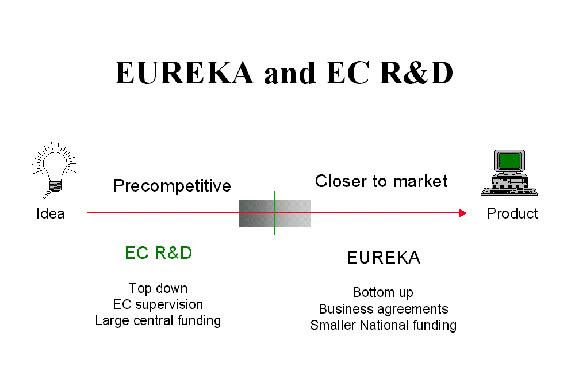 Government
support
Government
supportGovernment supports UK industry and academia through provision of public funding for a variety of diverse activities which advance the state of the art of critical technologies, or which assist industry to maintain its competitive edge. These lines of action are supported by multiple grants from EPSRC and other UK funding bodies. In addition, grants are also available at the European level to stimulate research and industrial application. The UK is beginning to attract more regional support; however, this can encourage competition between regions, which can lead to duplication and inefficient use of UK resources.
FORESIGHT is about anticipating the future; identifying potential needs, threats and opportunities; and encouraging people and organisations in the UK to act now to meet future challenges and take advantage of future opportunities. (See the Final UK Manufacturing FORESIGHT Report: "We can make it better"on www.foresight.gov.uk)
With this initiative, manufacturing issues are addressed by the Manufacturing 2020 Panel, whose objectives are:
Back to top of 'Government support'
The ICT Carrier Programme is a £10M National Programme which supports cross-sectoral technology transfer. Its aim is to improve the use of information and communication technologies (ICT) in engineering industries by adapting and transferring successful existing applications of ICT from other sectors. The programme supports sector-wide projects involving companies, trade associations and intermediaries such as regional and technology organisations and centres of manufacturing excellence such as higher education institutions. Projects will have several common characteristics:
Back to top of 'Government support'
The Systems
Integration Initiative
The Engineering & Physical Sciences Research Council supports
this initiative through a £20M industrially-oriented managed
academic research programme. 30 projects address the problems of
complex systems integration - particularly heterogeneous systems
of systems. (Details of the programme may be found elsewhere
on this ideo web site)
The original motivation for the Initiative was concern over the difficulties associated with the integration of complex artefacts - such as military aircraft, construction complexes, and healthcare information systems. But integration of artefacts requires integration of the processes involved in their development, and that this in turn requires integration of the information systems which underpin the processes, and that integration of processes ultimately entails integration of all the organisations involved in the 'supply mesh'.
The manufacturing research community has focused on 'process integration'. At its simplest, this has taken the form of integration of process models. This in turn has led to interest in the integration of the manufacturing information systems, which embody those process models and support the relevant processes. Concerns about process integration across enterprises have also inspired a quite separate line of research into business and organisational integration.
The information systems engineering community has concentrated upon architectures which facilitate integration, which is primarily concerned with resilience to change - that is to say support for evolution - and upon the problems of process integration.
A new and interesting line of research is in 'service architectures'. Rather than viewing information systems as support for processes, the researchers are viewing the integration of information systems in the context of the integration of services for which the owners of those information systems are responsible. The conceptual framework which this approach provides may have applicability in other domains. It is, for instance, being considered as a way of articulating better the relationship between physical architecture and the functionality of buildings required by and provided by the organisations using them. It offers a way of analysing the interoperation of organisations - not just the relationships between discrete organisations, but the relationships between parts of an organisation.
Back to top of 'Government support'
EUREKA is a 36 nation initiative to support R&D in Europe and also, under appropriate conditions, certain non-European nations. Its aims are:
Eureka projects must have a minimum of 3 European partners and deliver a demonstrator.
Back to top of 'Government support'
EC Framework Programme
The 20Bn euro Framework Programmes’ encompass all EU-funded
research, technology development, and demonstration activities in
Europe. The 5th Framework Programme, which runs until 2002, is
partitioned into Thematic and Horizontal Programmes. The Thematic
activities are Quality of life, Management of Living Resources;
Information Society Technologies; Competitive & Sustainable
growth; Preserving the Eco-system and Energy for the future. The
Horizontal Programmes include International Co-operation,
Innovation and SMEs, and Human Potential, involving potential
funding of 15 Billion Euros over 5 years. The first 2 years of
the Programme have delivered 39 MEuros to UK Manufacturing
Industry.
Strong indications so far are that the 6th Framework Programme monies might be used to add value to National Initiatives, particularly where high visibility large thematic projects are envisaged.
In preparation for this leverage, it would appear that the German Government has spent some £30 million on a National integration project called iViP, "integrated Virtual Product Creation". This project is based on the integration of product design and manufacturing, simulation and VR models across design and manufacturing. There is opinion that this will be used as a base to create a European wide automotive dominance by the creation of industrial manufacturing de facto standards. This initiative is based heavily upon the drive from Volkswagen in conjunction with manufacturing control, resource management (SAP), a machine tool and ergonomic simulation suppliers. Should this initiative prove successful for Germany, it could constrain the flexible and re-configurable systems integration requirement of the manufacturing service industry to which the UK appears to be heading.
Back to top of 'Government support'

Job Transition
As the economy changes, some industries and the areas where they
are concentrated will face traumatic change. The Government will
work with those affected to manage the process of change. To
support this work, they will create a Job Transition service to
help growing companies tackle skills shortages and enable
individuals affected by redundancy to find the right jobs more
quickly. The Government is investing in new sources of success
and the new steps to be taken include:
Back to top of 'Government support'